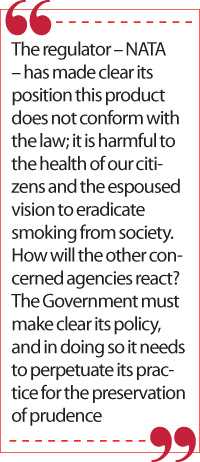Wednesday Feb 18, 2026
Wednesday Feb 18, 2026
Monday, 15 March 2021 02:30 - - {{hitsCtrl.values.hits}}
By Nihal Kulathilaka
|
NATA Chairman Dr. Samadhi Rajapakse has been up in arms questioning the need to manufacture cinnamon cigarettes, pointing to the myriad of other value-added products that could be churned out with world-famous Ceylon cinnamon – Pic by Shehan Gunasekara
|
The prevailing global and local environment presents the Government numerous challenges to overcome, and one might dare say part of the problem is our inability to persist with any particular everyday policy. Where administrators fail to uphold or defend its principles, chaos and confusion reigns; and regrettably this has become the state of play across a number of disciplines.
The latest travesty deals with public health and wellbeing of citizens. The coming of a supposed ‘Ayurvedic’ cinnamon cigarette into the market generated much interest, and sections of civil society continue to debate if this product is fit for circulation or consumption in our market.
As per existing law, notwithstanding this is not a tobacco product, the cinnamon cigarette cannot be sold in Sri Lanka. The National Authority on Tobacco and Alcohol (NATA) Act of 2006 clearly states any product mimicking a cigarette, promotes smoking as a habit and later extended to flavoured cigarettes are banned. This new ‘cigarette’ violates all of the above, but still made its way into the market on the back of what appears to be a ‘state supported’ communication campaign.
To be or not to be?
What really is our policy then? The law states this cannot be done but it has been done, seemingly with Government backing evidenced by its attribution to the Ministry of Industries. There has been no formal communication on the matter thus far by the Ministry of Health or the Ministry of Industries, and the product continues to be available in the market. What then becomes the legal position of a consumer and trader, as the product is conceivably illicit.
It was revealed the cinnamon cigarette was manufactured primarily for export, and a portion of products are promoted to the local market. NATA Chairman Dr. Samadhi Rajapakse has been up in arms questioning the need to manufacture cinnamon cigarettes, pointing to the myriad of other value-added products that could be churned out with world-famous Ceylon cinnamon.
He revealed NATA made representations to the Department of Ayurveda and the Ministry of Industries, but was yet to receive a formal response from these entities. A letter had also been issued by NATA requesting the company to stop manufacturing these cigarettes for the local market.
Gateway to tobacco smoking
Dr. Rajapakse echoed a number of pertinent questions. The primary concern being how the cinnamon cigarette could become a gateway product to tobacco smoking and smoking as a habit amongst Sri Lankans, including youngsters and women.
He revealed that tobacco smoking incidence was 16% at present in Sri Lanka, and this new product targets an entirely new segment of consumers which would increase our total smoking incidence. He asserted there is great tendency consumers of the cinnamon cigarette – both young and old – would turn to tobacco smoking later, which is far more addictive in nature.
Furthermore, what defines an Ayurvedic product? The simple reason that it is natural does not qualify any product as Ayurvedic medicine. Has the Department of Ayurveda assessed this product and approved of its Ayurvedic benefits, or is this an unstructured exercise that diminishes the value of our brand Ayurveda? The considerations are multi-fold.
In addition to placing consumers in jeopardy, the Government needs to consider the risks it poses to itself and therein the nation. This manufacturer of this cinnamon cigarette claims it is not bound by the NATA Act of 2006, and is therefore not subject to excise tax and regulations governing sales of tobacco products and cigarettes.
Accordingly, what are the revenue outcomes to the State? We are potentially creating a new consumer segment and industry that yields no revenue to Government. If a considerable number of consumers also switch from smoking tobacco-based cigarettes to this new product, what about the revenue fallout there which would be in the billions?
 Need for single policy
Need for single policy
Tobacco-based cigarettes cannot be promoted or sold to anyone under 21 years in Sri Lanka, how do these rules apply to cinnamon cigarettes? Furthermore, the lack of tobacco does not assure safety, as the process of mixing consumption with combustion is proven to generate many toxins that are harmful to human health as listed by numerous globally-acclaimed studies.
The Government has many considerations to make, and it mustn’t let this matter lie clouded in smoke. This involves the health and well-being of citizens and our future generations, and even the economic prospects of the nation. What message are we delivering to potential investors on Sri Lanka when we operate in such a state of flux?
The regulator – NATA – has made clear its position this product does not conform with the law; it is harmful to the health of our citizens and the espoused vision to eradicate smoking from society. How will the other concerned agencies react? The Government must make clear its policy, and in doing so it needs to perpetuate its practice for the preservation of prudence.
(The writer is a founding partner of legal and research firm based in Kandy with over 25 years of experience in the industry focusing on consumer interests.)